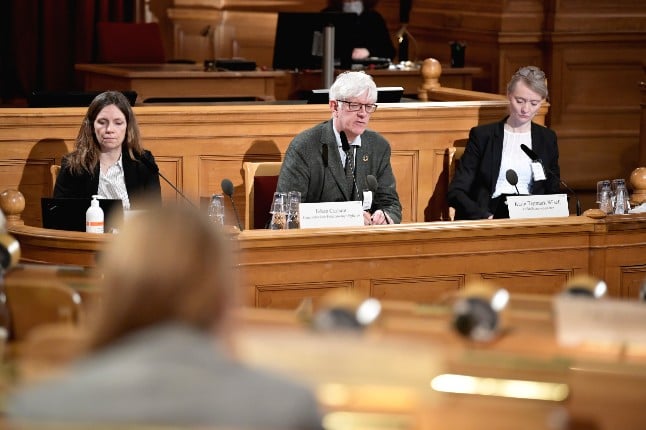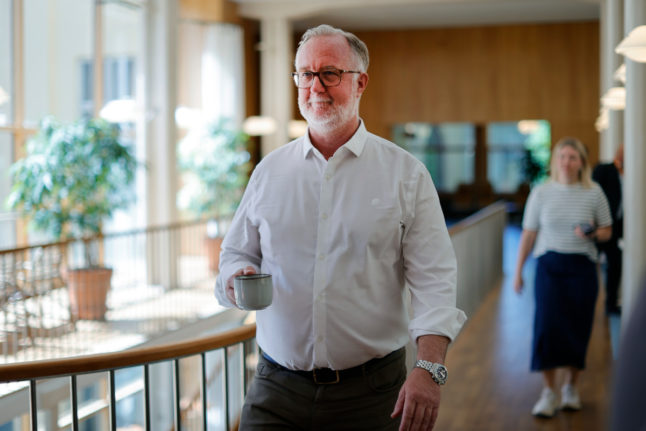What is the Committee on the Constitution?
The Committee on the Constitution (Konstitutionsutskottet, or KU) is the most powerful committee in the Swedish parliament. As as well as its narrower purpose of safeguarding the Swedish constitution, it is also tasked with examining the Prime Minister’s performance and the government’s handling of important matters.
The Committee is led by a member of the leading opposition party, with the head currently being Moderate party MP Karin Enström, Minister of Defence from 2012 to 2014.
The committee has the power to call anyone in Sweden for questioning from the prime minister down.
What is the remit of its investigation into Sweden’s handling of the pandemic?
The investigation was launched after Tobias Billström, the parliamentary leader of the Moderate Party at the end of January submitted a formal request which called for the committee to investigate “the government’s actions during the pandemic, with a special focus on the Swedish strategy and the government’s crisis management”.
In his request he asked for five broad questions to be covered:
- Which decisions has the government taken on the Swedish strategy? It is “unclear”, Billström argued, whether the government has itself taken decisions on strategy, or instead, “either intentionally or out of passivity”, delegated decision-making to government agencies.
- Has the government properly grounded its decisions on factual evidence? Did the government seek to gather alternative views and factual evidence, or did it simply trust the Public Health Agency on the facts, even though, in Billström’s words, “it was clear early on that many of the agency’s analyses differed from the conclusions reached by other experts, both internationally and […] in Sweden”.
- Has the government’s communication around the Swedish strategy been correct and sufficiently clear? “Although the Swedish strategy has been described in different ways over time,” Billström wrote, “the government and its agencies have refused to acknowledge this, which risks contributing to increased confusion around the Swedish strategy.”
- Has the government’s crisis management and crisis leadership been in accordance with the precautionary principle? “Overall, the government’s crisis management…has been more characterised by a ‘wait and see’ mentality than of employing the precautionary principle,” Billström wrote.
- Should the government have had a better ‘constitutional readiness’? With the government only starting work on its temporary pandemic law in August, Billström calls on the committee to look at what action the government took to understand the legal possibilities it had to impose measures to reduce the spread of infection, and what actions it took to understand how to increase those possibilities, as well as to look more generally at the powers given to the government in a crisis.
What impact could the investigation have?
This is one of two investigations being carried out into the Swedish coronavirus strategy.
The government gave the Coronavirus Commission, the body set up to investigate the country’s handling of the pandemic, a narrow remit initially, limiting the first phase of its investigation into the handling of the pandemic in the elderly care sector.
This meant that when the committee gave its first report in December, the bigger questions over Sweden’s decision to avoid the lockdowns seen elsewhere were only mentioned in passing. The commission’s second report, due on October 31st, will look into the choice of strategy as one of twelve different subjects.
With the current inquiry by the KU, the opposition Moderate party has much more control over the questions that can be asked, increasing the possibility that blame will land at the government’s door.
On the other hand, the way parliamentary committees function, with their heavy reliance on calling in key figures for questioning, may make it hard to dig down into sufficient detail to do the government serious damage.
What has the committee’s chair said about the investigation?
Enström has said the committee wants to take “an overall approach to the strategy” and said that it would not necessarily end up agreeing with the insinuations made in Billström’s request.
“It’s important to get answers on who has been taking the decisions and how it’s happened,” she said. “That’s why it’s important to have this investigation. We are pushing onwards and we have no pre-prepared answers in the Committee on the Constitution.”
What’s come out of the meetings so far?
In March and April, people who have been questioned include Anders Knape, the chairman of the Swedish Association of Local Authorities and Regions; Harriet Wallberg, Sweden’s former coronavirus testing coordinator; Olivia Wigzell, the General Director of the National Board of Health and Welfare; Johan Carlson, General Director of the Public Health Agency; and Dan Eliasson, the former General Director of the Civil Contingencies Agency.
Wallberg said that if Sweden had tested extensively in April, as Finland and Denmark did, it might have been possible to identify more infections among care home staff and thereby reduced the number of deaths in elderly care homes.
Carlson denied that Sweden had changed its strategy and said that his agency had been forced to limit testing to health workers and those hospitalised due to shortages.
Eliasson said that his agency had warned of equipment shortages already at the start of February, but that its warning had not been heeded, and had pushed for earlier and more extensive action throughout the pandemic.
Health Minister Lena Hallengren and Home Affairs Minister Mikael Damberg faced questions about whether or not a formal government decision was ever made about Sweden’s overarching pandemic strategy (the answer was no), and the government’s responsibility for the shortage of protective equipment.
What happens next?
Prime Minister Stefan Löfven was to be questioned on April 26th, with the result of the report expected in June. You will be able to watch his hearing online (in Swedish) HERE. It is scheduled to start at 1pm.



 Please whitelist us to continue reading.
Please whitelist us to continue reading.
The inquiry’s two-hour questioning of Johan Carlson, Director-General of the Public Health Agency, is available at: KU-utfrågning med Johan Carlson, generaldirektör för Folkhälsomyndigheten Öppen utfrågning 26 mars 2021 – Riksdagen .
Two hours of parliamentary-inquiry Swedish might sound a bit heavy-going, but it’s split roughly into four parts which enables you to press the pause button from time to time. Fascinating stuff for those really interested. Carlson rarely wastes his words, and I find it’s always worth listening carefully to what he says.
One small anecdote: he used an idiomatic expression when talking about whether Sweden had changed its strategy and said “en strid av påvens skägg” – literally “dispute about the Pope’s beard.” The expression apparently means quibbling or hair-splitting. Interesting one. Haven’t heard or seen it before.
P.S. I can’t get the link above to work properly. Copy and paste into your browser and it will take you to a bing.com page where you can then click on the hyperlink to the Riksdagen site with the KU-session.